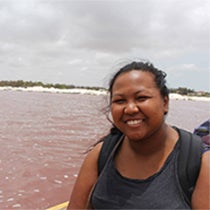Harvard College Undergraduate Student Profile: Soa Andrian
Although the burden of disease has declined in recent years, malaria is still a problem in dire need of a solution. To eliminate and ultimately eradicate malaria, the global public health community relies upon the expertise and skills of individuals and partners from a variety of sectors, including industry, government, commerce, academic, and the general public.
At Harvard, a faculty-led initiative called, Defeating Malaria: From the Genes to the Globe, is inspiring the next generation of global health leaders to end malaria for good through an innovative, term-time Undergraduate Colloquium. This capstone experience provides students with a multidisciplinary perspective of malaria that enables them to learn more about the complexities of the disease, its impact on society and the environment, and potential ways to attack the problem. This past spring, Harvard College undergraduate Soa Andrian ’16 applied to the Undergraduate Colloquium to gain a better understanding of the intersectionality of malaria. She was part of a cohort of 23 students who learned about the disease from Harvard experts over the course of several weeks.
But this was not Soa’s first brush with global health. Since high school, Soa has been interested in diverse aspects of global health. As a strong supporter of the notion that health is a human right, she has dedicated her studies and professional aspirations towards making a positive impact on health and human development. As part of her study, she’s completed coursework in health policy, human rights, and a course on “Case Studies in Global Health: A Biosocial Perspective,” taught by renowned global health advocate Dr. Paul Farmer.
As a rising junior at Harvard College, Soa traveled to Africa as part of the Harvard Global Health Institute sponsored International Summer Undergraduate Research in Global Health (I-SURGH) Program. As an ISURGH fellow, she gained hands-on research experience in malaria labs at the Harvard T.H. Chan School of Public Health and the Harvard Malaria Initiative’s research site in Dakar, Senegal. In Senegal, Soa worked on the relationship between the genetic barcode (or genetic “identity”) of parasites in patient samples with gametocyte production. Gametocytes are a form of the P. Falciparum parasite that are responsible for malaria transition. Senegal, in the past several years, has run a successful malaria control program resulting in lower malaria transition and lower diversity of parasite strains, meaning a lower diversity of genetic barcodes in parasite populations. Soa’s project followed the question: Did the malaria control program result in the selection for certain strains that are particularly good at making gametocytes? The goal of Soa’s project was to preliminarily investigate whether there is a relationship between parasite strain and gametocyte production, as a proxy for the relationship between the parasite strain and transmission.
After returning from Senegal, Soa continued her malaria research at the Chan School in the laboratory of Adjunct Professor Matthias Marti, trying to understand in-host parasite dynamics in multi-strain P. falciparum infections in the context of sexual stage conversion and transmission. The Marti Lab’s work focuses on sexual stages of P. falciparum as they relate to transmission of malaria, specifically studying triggers and underlying mechanisms for sexual stage commitment and conversion, as well as sequestration of sexual stage parasites in host. This work is based on new genetic barcode technology developed by Professor Dyann Wirth, a Harvard researcher and co-organizer of the Undergraduate Colloquium. Summarizing her work in the Marti lab, Soa explains: “We are trying to learn more about parasite population dynamics and human infection.”
According to Soa, participating in the Undergraduate Colloquium provided her with an opportunity to share her knowledge of malaria and discuss her research, both on campus and in Africa. She quickly became a valuable resource to fellow students and realized that despite their varied backgrounds and academic studies, they group shared a common interest: to improve human lives by making a lasting impact on global health.
By pursing diverse academic and research experiences in global health at Harvard, Soa has gained a wealth of knowledge on the topic, spanning from molecular and cellular biology to health policy and advocacy. This summer, Soa will intern at John Snow Inc.’s International Division where she hopes to gain more experience implementing field-based projects and learning about the global health consulting sector. After she graduates from Harvard College in December 2016, Soa hopes to continue working in public health and possibly pursue an advance degree in public health, epidemiology, or biostatistics.

Soa Andrian (’16 Molecular and Cellular Biology Concentrator) at Lac Rose in Senegal
As an International Summer Undergraduate Research in Global Health (I-SURGH) Fellow in Senegal, Soa investigated whether there is a relationship between parasite strain and gametocyte production, as a proxy for the relationship between the parasite strain and transmission.